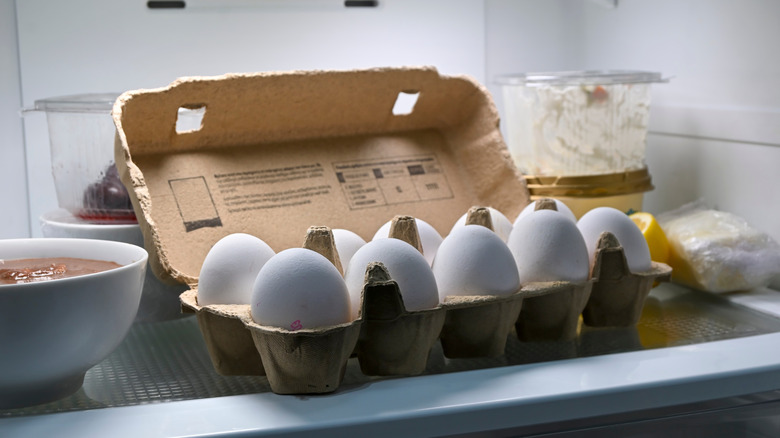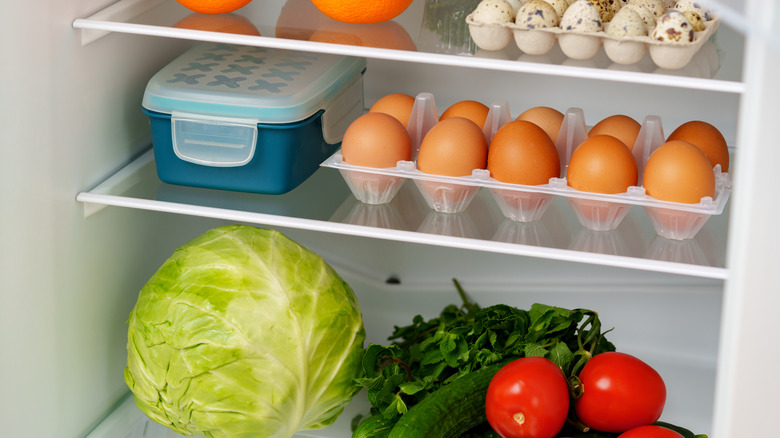How Long Eggs Last In The Refrigerator, According To A Food Scientist
Americans traveling to the United Kingdom or other European countries might be shocked to find that nobody refrigerates their eggs. In European grocery stores, the eggs are just ... there on the shelves. In households throughout the continent, egg cartons sit on countertops and in cupboards at a comfortable room temperature. In the States, however, everyone prefers to refrigerate their eggs, and it turns out that's probably the best way to keep them, as they last a heck of a lot longer when they're cold. How much longer? Well, eggs are typically good for around three to five weeks in the fridge but the exact length of their freshness depends on how you store them in your fridge.
According to the U.S. Department of Agriculture (USDA), eggs can be refrigerated safely for three to five weeks from the day you put them in the fridge — even if the sell-by date expires during that time. There are some caveats, however. Everything from how quickly you refrigerate eggs, to where you put them in the fridge, and even their position within the carton can contribute to how long they stay fresh. What's more, refrigerating eggs is much more important in the United States due to the way in which they're prepared.
How to store eggs for maximum freshness
Three to five weeks is actually quite a long shelf life (or fridge life) for refrigerated eggs, but it does depend on proper storage. The USDA recommends taking eggs home immediately and refrigerating them at 40 degrees Fahrenheit or slightly lower. You should also leave them in the carton and make sure they're stored in the coldest part of the refrigerator (modern versions of which Albert Einstein actually had a hand in creating). Placing eggs in the door isn't advisable as the temperature fluctuates much more in that area, and if eggs aren't keep refrigerated once they've already been cooled, condensation can build up inside and lead to nasty bacteria.
Another tip comes from Zachary Cartwright at the Food Safety and Quality Management Division at the Institute of Food Technologists. Cartwright spoke to CNET about proper storage of eggs and advised keeping them with the pointed end facing downwards. This has to do with the air cell inside the eggs themselves. This air gap forms after the egg is laid and its contents cool and contract. It sits between the inner and outer membranes of the egg and gets larger with time. But more crucially it can help keep things fresh. By placing eggs with their pointed ends down, the air cell remains at the top and helps prevent moisture loss.
Otherwise, you can be fairly confident that eggs will last for up to five weeks if you've stored them properly in the refrigerator (hard-cooked eggs can last a week in the fridge). All of which just raises the question of why so many countries don't follow that advice.
Can you really keep eggs out of the refrigerator?
Part of the reason for Europeans keeping their eggs out of the fridge has to do with the egg "cuticle" — a thin organic layer on the outer surface of the egg which acts as a barrier to prevent harmful microbes from entering the inside. In a 2022 study published in Frontiers in Immunology, researchers reviewed the existing literature and noted that these cuticles are vital for maintaining the safety of eggs for human consumption and that eggs with damaged or no cuticles are more likely to become contaminated by bacteria, including Salmonella. Why would you wash such a crucial barrier off an egg, then? Because the USDA tells you to.
In the early 1970s, the USDA required egg producers to wash and refrigerate their eggs. This influenced other countries including Canada, Japan, and Scandinavia, all of which now wash and refrigerate their eggs. Europe, however, mostly persisted in relying on the eggs' natural protective properties to keep unwanted microbes at bay. But it seems this might not be the ideal approach.
In a study published in the journal Poultry Science (yes, that's a journal), researchers set out to identify the ideal egg storage conditions. The research team compared a variety of eggs stored at 39.2 degrees Fahrenheit (4 degrees Celsius) with eggs stored at 71.6 degrees Fahrenheit (22 degrees Celsius). Within the chilled group, there were variations of washed and unwashed eggs. The results showed that the U.S. has the best approach to egg storage as, after 15 weeks, all the refrigerated eggs were assessed as Grade A, while those stored at room temperature dropped from Grade AA to almost Grade B in just a single week. This led the team to conclude that room temperature storage "rapidly declines egg quality" regardless of whether the cuticle had been kept intact. In short, refrigerating your eggs is always the best approach.


